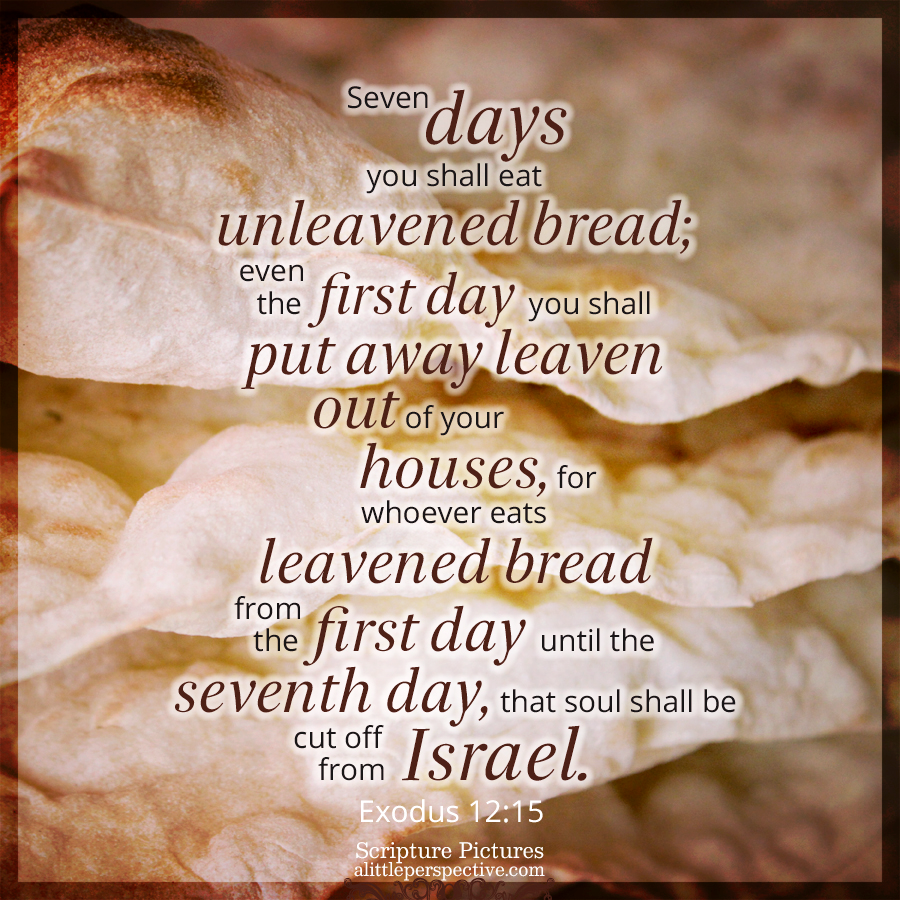Read Exodus 12 and 13 at Bible Gateway.
Hebrew paragraph divisions:
Exo 12:1-20 {p} Passover + Unleavened Bread instruction
Exo 12:21-28 {s} Israel observed the Passover as YHVH had commanded Moses
Exo 12:29-36 {p} Final plague: death of the firstborn
Exo 12:37-42 {p} Israel ceased their sojourn in Egypt
Exo 12:43-50 {s} The ordinance of the Passover
Exo 12:51 {p} YHVH brought Israel out of Egypt
Exo 13:1-10 {p} Ordinance of the firstborn + Unleavened Bread
Exo 13:11-16 {p} Ordinance of the firstborn a sign to future generations
Exo 13:17-22 {p} God led them Himself in a pillar of cloud and fire
Exo 1:1-12:42 chiastic structure:
1a) Exo 1:1-7, Israel began their sojourn in Egypt;
1b) Exo 1:8-6:9, Egypt plagues Israel;
1c) Exo 6:10-7:2, Moses commanded to meet with Pharaoh and tell him YHVH’s demand;
central axis) Exo 7:3-5, YHVH will glorify His name;
2c) Exo 7:6-13, Moses meets with Pharaoh;
2b) Exo 7:14-12:36, YHVH plagues Egypt;
2a) Exo 12:37-42, Israel ceased their sojourn in Egypt.
Picking up the strong themes of Exodus:
Exo 11:1-12:20 {sx3+p} Warning of the final plague
Exo 12:21-36 {s+p} The final plague, the death of the firstborn
Exo 12:37-42 {p} Israel ceased their sojourn in Egypt
Exo 12:43-51 {s+p} By the Passover, YHVH brought Israel out of Egypt
Exo 13:1-16 {p+p} Ordinance of the firstborn + unleavened bread a sign to future generations
I put Exo 13:1-16 together as a strong theme, since the very next paragraph beginning in Exo 14:1 is a weak paragraph, and the beginning of another strong theme cycle (which we will look at tomorrow).
Really, to us non-native Hebrews, the instruction concerning the firstborn and Unleavened Bread might seem like two separate instructions, but by the Hebrew paragraph divisions, we see that God considers them a single topic (Exo 13:1-10). But the redemption of the firstborn is intrinsically and forever tied to the memorial feasts of Passover and Unleavened Bread, for it was during the slaying of the firstborn of the Egyptians that Israel’s firstborn were redeemed. So the memorial feasts teach our redemption by the blood of the Lamb, as we would expect, since Jesus told us that Moses wrote about Him (Joh 5:46). But the interesting thing about the ordinance of the firstborn, and the ordinance of the memorial feasts, and how these two strong paragraphs are grouped together as a strong theme, is that they are signs for future generations. This is Bible language, kind of like idiomatic code. And when you see it, pay attention, because what it is telling you is this, in modern English:
Do you want your children to see and understand and receive for themselves the redemption purchased for them by the blood of the Lamb? This is how you transfer that important living concept from one generation to the next: observe the ordinance of the firstborn and observe the memorial feasts of Passover and Unleavened Bread. We do these things, year after year, so that the children grow up immersed in the history, honor, teaching, and family and social traditions, which act as living parables and paint living pictures in concrete terms, teaching spiritual truths.
Jesus taught us this way. He opened His mouth in parables, when He wanted to teach the people something about the kingdom of heaven. He told stories of every day people pursuing every day pursuits in their every day lives, that we could look out the window and see with our own eyes, or experience for ourselves. This is how God teaches men about Himself, and why the foundational books of the Bible, the Torah, are books of history- prophecy. The Torah tells the True Story and real events that actually happened in the natural world, which nevertheless prophesy of spiritual truths and events to come.
So the Church has traditionally discarded the practice of the memorial feasts of the LORD (Lev 23:1-2) as something Jews do (even though they are never called ‘the feasts of the Jews’ in Scripture, only men call them that. Scripture always calls them ‘the feasts of the LORD’). And today we wonder why 90% of the young people raised in Church leave the faith upon adulthood. Maybe God is smarter than we are, and we should listen to Him when He gives us keys for future generations. Maybe we should teach spiritual truths the way He teaches spiritual truths, by concrete example in a repeating memorial cycle, if we want to be successful in transferring our faith and culture to the next generation.
I am passionate about this because we experienced this firsthand in our own family! (About Christine).
For further reading:
the feasts of the LORD index of studies (includes how we celebrate)
Patterns of Evidence: Exodus documentary
My review of Patterns of Evidence: Exodus

















Leave a Reply